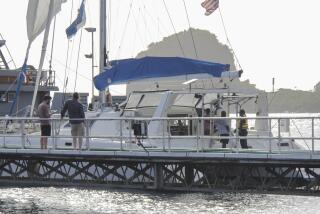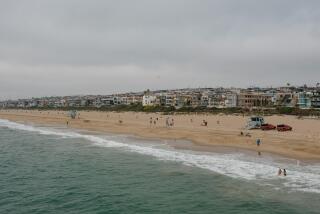Kayaker indicted for murder after fiance’s body turns up in Hudson River
When a corpse was found in the Hudson River over the Memorial Day weekend, there were none of the usual questions about its identity. Few doubted that it was Vincent Viafore, a kayaker whose disappearance while out paddling with his fiancee is at the heart of a murder case captivating the scenic towns along the water.
Prosecutors say Viafore’s fiancee, Angelika Graswald, 35, killed her strapping 46-year-old boyfriend on April 19 while the two were out for one of their regular kayaking trips.
Graswald, a native of Latvia in eastern Europe, stood to gain a quarter-million dollars from Viafore’s life insurance, Assistant Dist. Atty. Julie Mohl said at a bail hearing on May 13, two weeks after Graswald’s arrest and nearly a month after Viafore vanished.
Graswald, who is being held on $3-million cash bail, says she is innocent. After her last court appearance, Graswald’s attorney, Richard Portale, denied prosecution allegations that she had confessed to tampering with Viafore’s kayak and said his client was the victim of a misunderstanding caused in part by a language barrier.
“Even if she doesn’t understand what you’re saying, she’ll answer it in an affirmative tone,” Portale said of Graswald, who came to the United States when she was 20. “You think you’re communicating effectively, but you’re really not. She’s not getting what you’re saying.”
At the bail hearing, Mohl did not explain how Graswald allegedly sabotaged Viafore’s kayak, but an indictment handed up Tuesday accused Graswald of removing a plug from her boyfriend’s boat so that it would fill with water and moving a paddle out of his reach as he struggled to survive.
Mohl said Graswald told investigators that “it felt good” knowing her boyfriend of more than three years would die because she wanted out of the relationship.
“She felt trapped, and it was her only way out,” Mohl said.
The tale of a seemingly happy couple embroiled in a fight to the death on a picturesque waterway is reminiscent of a famous murder case that unfolded more than 100 years ago on Big Moose Lake in upstate New York. There, in 1906, police said a handsome 23-year-old factory worker named Chester Gillette used a tennis racket to club his pregnant fiancee, Grace Brown, after taking her out on the remote lake for what she thought would be a romantic boating trip.
Brown died. Gillette claimed Brown had committed suicide by jumping into the icy water. He was convicted and put to death in the electric chair in 1908. The sensational case inspired Theodore Dreiser’s novel “An American Tragedy.” The book became the basis for the movie “A Place in the Sun,” starring Montgomery Clift as the young man and Shelley Winters as his devoted, doomed fiancee.
“This could be a made-for-TV movie,” Larry Hanretta said one windy afternoon as he sat on a bench in a riverside park overlooking the water where Viafore and Graswald took their final kayak trip, about 50 miles north of New York City. Their destination that day, an island with the ruins of a Scottish castle on it, was visible across the white caps on the river.
Like a lot of locals who have been transfixed by the case, Hanretta had his own theories about how Graswald might have killed Viafore - Vinny to his friends - who was far taller and heavier than his girlfriend. “She could have whacked him with a paddle,” he said.
As for the body, another man fishing nearby said he was “absolutely certain” Viafore had been weighted down with cinderblocks and was at the bottom of the river. “She didn’t act alone, that’s for sure,” said the man, John Guttierez.
Guttierez’s theory was disproved on May 23 when Viafore’s body, absent cinderblocks, was discovered near a private yacht club in this village.
Prosecutors haven’t said what evidence led them to arrest Graswald on April 29, while she was visiting the island that she and Viafore had kayaked to on their last day together.
On their way to the mainland, sometime after 7 p.m., Graswald said the wind picked up and they ran into choppy waters.
“I saw him struggling a little bit. He was trying to figure out how to paddle the waves, because they were getting crazy,” she told Westchester County’s News 12. “And then I just saw him flip.”
Graswald said Viafore was not wearing a life preserver and disappeared in the frigid, choppy river. She dialed 911 before her kayak also overturned. Officials said Graswald was suffering from hypothermia by the time a boater picked her up and brought her to shore.
The indictment, which charges Graswald with one count of second-degree murder and one count of second-degree manslaughter, alleged she intentionally waited to call for help to ensure Viafore drowned.
“Initially we believed her to be the survivor of a tragic accident,” police Maj. Patrick Regan said after Graswald’s arrest. “Some inconsistencies in the account she gave in those last minutes led investigators to be suspicious.”
Portale says prosecutors have not explained what those inconsistencies were. The defense attorney also has said people are unfairly using Graswald’s apparent upbeat demeanor after Viafore’s death against her. “She comes from a society where weakness, whether it’s in the form of sorrow, grief, fear, is frowned upon,” he told ABC News.
Among other things, Graswald posted dozens of pictures and videos on Facebook in the days after Viafore vanished. They include photographs of Graswald, a sweet-faced woman with a mane of waist-length hair, doing yoga, grinning for a selfie, and playing with her kitten. Graswald also posted pictures showing her and Viafore gazing at each other lovingly.
Her last posting, hours before her arrest, was a video Graswald made as she drove down the hill into the parking lot of the yacht club near where Viafore’s body was found.
“What a beautiful day,” she said as the river sparkled to her left.
The case has captured local attention and attracted some national coverage, including a jailhouse interview Graswald did with People magazine and a segment on “Nancy Grace.”
The Poughkeepsie Journal newspaper asked readers to weigh in on whether they believed Graswald had killed Viafore. It said 76% of respondents, or 189 people, voted for guilt against 61 who said Graswald was innocent. Graswald has not yet entered a plea.
Whichever way the case goes, officials said it should serve as a cautionary tale for kayakers who venture into the Hudson River.
“The water is still very cold. The weather can change very quickly,” New York State Police Capt. Brendan Casey said last month, when police were operating under the belief that Viafore was the victim of a tragic accident. “People should use caution.”
Follow @TinaSusman for more national news
More to Read
Start your day right
Sign up for Essential California for news, features and recommendations from the L.A. Times and beyond in your inbox six days a week.
You may occasionally receive promotional content from the Los Angeles Times.






